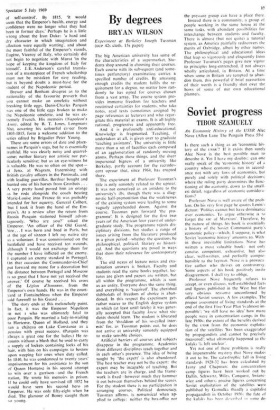By degrees
BRYAN WILSON
Experiment at Berkeley Joseph Tussman (our 42s cloth. 15s paper) The big American university has some of the characteristics of a supermarket. Stu- dents shop around in choosing their courses.
Each course with its subsequent (and some- times perfunctory) examination carries a specified number of credits. By amassing enough credits the student fulfils the re- quirement for a degree, no matter how ran- domly he has opted for courses chosen from a vast array. The course system pro- vides immense freedom for teachers and routinised certainties for students, who take notes, read texts (sometimes assigned by page references at lectures) and who regur- gitate this material at exams. It is all highly rational, progressive and apparently free. And it is profoundly anti-educational. Knowledge is fragmented. Teaching, if undertaken at all, is given over to graduate 'teaching assistants'. The university is little more than a set of faculties each composed of an agglomeration of randomly moving atoms. Perhaps these things, and the sheer impersonal bigness of a university like Berkeley, partly account for the recrudes- cent uproar that, since 1964, has erupted there.
The experiment of Professor Tussman's title is only remotely related to the uproar. It was not conceived as an antidote to the university's ills. though there was a diag- nostic half-premonition that the weaknesses of the existing system were leading to some vaguely apprehended doom. Against the course. Tussman puts forward 'the pro- gramme'. It is designed for the first two years (of the American four years) of under- graduate study. The programme rejects dis- ciplinary divisions, but studies a range of issues arising from the literature produced in a given period —whether the questions be philosophical, political, literary or histori- cal. And the questions are posed in ways that show their relevance for contemporary life.
The old nexus of lecture notes and exa- mination answers is broken. Faculty and students read the same books together, lec- tures are given and papers are written, but all within the programme, which is seen as an entity. Everyone does the same thing, and everything is 'required'. The cherished shibboleth of freedom of choice is aban- doned. In this respect the experiment gets rather nearer to the English degree system in which (at least until lately) it was gener- ally accepted that faculty knew what stu- dents should learn. The student is liberated from the 'thraldom of his so-called inter- ests' for, as Tussman points out. he does not arrive at university remotely equipped to make sensible choices.
Artificial barriers of courses and subjects disappear in the programme. Academics from different disciplines teach together and in each other's presence. The idea of being taught by 'the expert' is also abandoned. The best teacher may not be the expert: the expert may be incapable of teaching. But the teachers are in charge, and the frame- work is fixed—however much they hammer it out between themselves behind the scenes. For the student there is no participation in arranging courses. Political democracy, Tussman affirms, is nonsensical when ap- plied to college: neither the box-office nor the pressure group can have a place there.
Instead there is a community, a group of people working in the same house at the same tasks, with abundant possibilities for interchange between students and faculty. There is almost (but not quite) a tutorial system, as America painfully rediscovers the merits of Oxbridge, albeit by other names. The philosophical and educational ideas that leap so vigorously and eloquently from Professor Tussman's pages give new vigour to principles long-entrenched, if not always wholly articulated, in Britain. At a time when some in Britain are tempted to aban- don them, this powerful if brief reassertion of their worth is a friendly shot over the bows of some of our own educational planners.


































 Previous page
Previous page